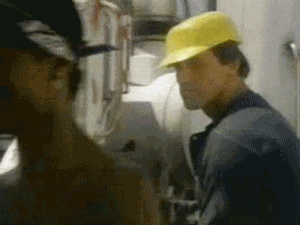- Safety Knights Monday Mailer
- Posts
- 7th Edition Monday Morning Newsletter
7th Edition Monday Morning Newsletter

Good morning! Over the past few weeks we’ve noticed a few articles and trends that we thought we needed to cover in this weeks edition. Dairy farms and trains are things we probably don’t think enough about but, both play a significant role in our daily lives. Think, cream for your coffee, ice cream, milk, the number of train tracks you have crossed in your life, how often you hear the sound of a train, not to mention all the products we order that took rail to get to us. And yet, as safety professionals, there are some things happening in both industries we think everyone should be aware of. This week, we will still bring your weekly dose of tips, tricks and EHS insight, but we are also going to talk farms and trains. So, if you’re ready, grab your favorite morning beverage (sans cream for us) and lets dive in to this weeks edition!
THIS WEEK’S TIPS
Tips you’ll find in this weeks edition:
Seasonal Employee Safety
Navigating New Indoor Heat Standards
Preventing Asthma Deaths
Understanding and Healing from Workplace Trauma
AGRICULTURE
Spilled Milk.

You won’t look at milk the same way again.
We all know the saying, “it’s no use crying over spilled milk”. But maybe in this case we should. Over the past few weeks ProPublica has reported on the dangers, deaths and realities of working on America’s dairy farms. OSHA Investigates Small Dairy Farms So Rarely That Many Worker Advocates Don’t Bother to Report Deaths and Injuries, reported on:
Worker deaths on farms often involve drowning, crushing, or trampling incidents.
Congress bans OSHA from investigating farm deaths on farms with fewer than 11 workers unless they have employer-provided housing.
Different states interpret and apply this exemption inconsistently, leading to a patchwork of enforcement.
Advocates argue that this system is fundamentally unfair, leaving some deaths uninvestigated.
OSHA has not consistently labeled farm housing for immigrant dairy workers in Wisconsin as a temporary labor camp, impacting investigations.
Since 2005, OSHA couldn't investigate 44 safety incidents on dairy farms due to the small-farms exemption.
The definition of "temporary" or "permanent" workers and the use of federal guest worker programs add complexity to OSHA's decisions.
Some states, like California, Oregon, and Washington, inspect farms of all sizes without a small-employer exception.
Advocates argue that small farms in states relying on federal OSHA may not prioritize safety due to lower chances of investigation.
Inconsistencies in enforcement have led to calls for a more standardized and fair approach to investigating worker deaths on small farms.
While, Dairy Workers on Wisconsin’s Small Farms Are Dying. Many of Those Deaths Are Never Investigated, reported:
At least 17 workers — mostly immigrants — have died on Wisconsin dairy farms since 2009. Twelve of those deaths happened on farms with fewer than 11 workers.
For decades, Congress has barred the Occupational Safety and Health Administration from enforcing safety laws on farms with fewer than 11 workers unless they have what’s called a temporary labor camp.
Thousands of immigrant workers on dairy farms in Wisconsin and across the country live in employer-provided housing — which could be a trailer on the property or an apartment in town.
OSHA has repeatedly, though inconsistently, said housing for immigrant workers is a type of temporary labor camp — and as a result has inspected some small Wisconsin dairy farms after worker deaths.
ProPublica identified three deaths on small Wisconsin dairy farms, including a worker’s recent drowning in a manure lagoon, that OSHA didn’t investigate even though workers lived in employer-provided housing.
And if you’re wondering if the different standards being implemented from state to state matter? The answer is, yes, according to research published in the American Journal of Industrial Medicine. The research concluded,
Fatality rates were approximately 1.6 to 3 times as high in both groups of states observing the small farm exemption as in the group of three states not observing it. Comparisons excluding the agriculture industry showed weaker differences. The three states' (California, Oregon, and Washington) opting out of the small farm exemption may have had substantial direct effects. They may also reflect and/or encourage a generally more effective approach to occupational health and safety. Although alternative explanations must be considered, the stakes are high in terms of injury and loss of life; further investigation seems urgently indicated.
In other Agriculture Safety News
Hiring seasonal employees? While the extra hands make the retail holiday season go round, it also comes with it’s own set of workplace safety challenges. So, why not take a page out of the Horticulture Industries approach to seasonal workplace safety?
PRESENTED BY EHS Momentum
EHS Momentum is a Game-Changer!
Introducing EHS Momentum, the game-changer in the world of EHS! EHS Momentum is on a mission to revolutionize the lives of EHS staff everywhere. They have cutting-edge EHS management software and consulting services that will amaze you. Imagine having simple and affordable environmental, health, and safety best practices at your fingertips, no matter the size of your business. With their MyMomentum™ safety management software, you'll experience a whole new level of efficiency. And that's not all! They also offer the Momentum Roadmap™️, a tool that empowers safety teams with easy-to-use tools and expertise. Get ready to unleash the power of EHS Momentum and watch your safety team succeed. Say goodbye to struggling and hello to a future filled with excitement, simplicity, and expertise. EHS Momentum is here to make your EHS dreams come true!
WORKPLACE HEAT STANDARDS
Winter is HERE, can we turn on the HEAT?

California is flexing it’s safety muscles.
California is making some changes when it comes to indoor heat prevention standards and it might effect you. Warehouses, distribution centers and manufacturing plants are expected to be the most effected by the proposed change. The proposed changes have entered the second 15-day notice window for the new modifications, which will end on November 28, 2023.
The Changes
Establish, implement, and maintain a written Indoor Heat Illness Prevention Program.
Program includes procedures for water access, close observation, cool-down areas, and emergency response.
Provide effective training on heat illness topics for employees and supervisors.
Ensure access to cool-down areas maintained below 82 degrees, shaded, and shielded from radiant heat.
“Allow and encourage” additional cool-down rest periods for employees.
Monitor employees during rest periods for symptoms of heat-related illness.
Closely observe new employees during a 14-day acclimation period.
Monitor employees during heat waves without effective engineering controls.
It is expected that these proposed changes will be voted on in the first quarter of 2024 with implementation of the new regulations by the summer of 2024.
If you’re interested, you can review the current proposal here.
Other Heat Related News
The Miami-Dade Board of County Commissioners delayed their vote on a municipal heat standard for outdoor workers until March for further debate. The proposed legislation’s aim is to safeguard workers, particularly in construction and agriculture, by ensuring on-the-job heat safety measures such as access to water, shade, and rest breaks. The change is designed to outline outdoor employee rights, mandates companies to establish a compulsory heat exposure program, and stipulates penalties for violations.
Currently, there is no OSHA heat related standard but plans to develop one. However, the OSHA timeline for developing standards is long, leading to local state and city leaders creating their own worker safety requirements. With an estimated 1,300 Americans dying from extreme heat each year and that number estimated to reach 60,000 by 2050, now is probably a good time to start thinking about your future workplace heat safety initiatives.
RAIL SAFETY
“You Shall Not Pass”

Union Pacific might run you over for this.
“You shall not pass.” It’s a line from the movie Lord of the Rings. In the scene Gandalf (a wizard) is preventing this mystical fire monster from passing over a bridge, to protect his companions.
Now, I know you’re probably wondering, where we are going with this? So, we’ll get right to it. One, we just really wanted to use this gif and two, there are some oddly ironic parallels between Bradley Haynes, a Union Pacific railyard inspector, Gandalf, the mystical fire monster and train derailments that lead to, “…flaming cars and noxious smoke on a community…”, as described in an excerpt from another ProPublica, “Do Your Job.” How the Railroad Industry Intimidates Employees Into Putting Speed Before Safety. According to the investigating, the rail safety stats we hear are far from being accurate. With the real numbers indicate greater safety issues, as companies put profit and speed over safety, retaliating against employees and whistleblowers who point out serious safety issues. Something that happened to Haynes and his coworkers at their Union Pacific railyard.
“OSHA and Department of Labor administrative judges found railroad companies violated whistleblower laws in 13 cases since 2018 in which workers voiced safety concerns.”
After repeated threats from the Union Pacific Director of Maintenance to stop hindering speed because of safety issues, Hayes flagged a car for a serious safety issue, broken brakes, which was overruled by his manager. Allowing the car to be used without the brakes being fixed. The incident was reported by Haynes. Union Pacific, retaliated by closing the railyard. The action by Union Pacific was a follow through on the Director of Maintenance’s threat which Haynes had recorded. Haynes and his coworkers subsequently filled a report with OSHA providing them with the recorded evidence of the treat. OSHA dismissed their case. Unfortunately, this is not a unique sequence of events as BNSF, Norfolk Southern and CSX have all be accused of similar tactics.
ProPublica has reported on safety and regulatory issues in the rail industry over the past year:
While, reading the reports in these ProPublica articles can only be described as troubling and disturbing, to say the least. It forces us to think as safety professionals, “what can be done?” We believe by bringing this info to you, we have all taken the the first step towards change. You can’t fix things if you don’t know they are broken. And if you’re looking to continue the conversation on this or any other topic, consider our community of fellow Safety Professionals. Who knows, maybe you’ll meet and connect with some cool people and change the world.
DON’T FORGET YOU DISCOUNT
Don’t forget your discount SKsaves10
Compliance training online is the way to go because they've got the best content and customer service in the biz. With over 30K trusted clients, including government agencies and universities, their certificates are accepted on a federal level. Trust us, we've been in business since 2008.
NEWS
Your Virtual Water Cooler
Massachusetts Department of Public Health Calls for Tougher Action by Cannabis Industry to Improve Health and Safety After Work-related Asthma Death.
At Tesla’s Giant Texas Factory, Injuries and Safety Lapses Mount.
James Bond actor calls for improvements to health and safety on set.
Tips for understanding workplace trauma and how to heal from it.
National Media to take over Workplace Health and Safety Shows.
Research reveals extent of workers breaking rules.
SHARE THE NEWS
Enjoying the newsletter? Share it and earn some free Safety Knight swag. The more referrals you have the more you earn!
All you need is one to start earning.



